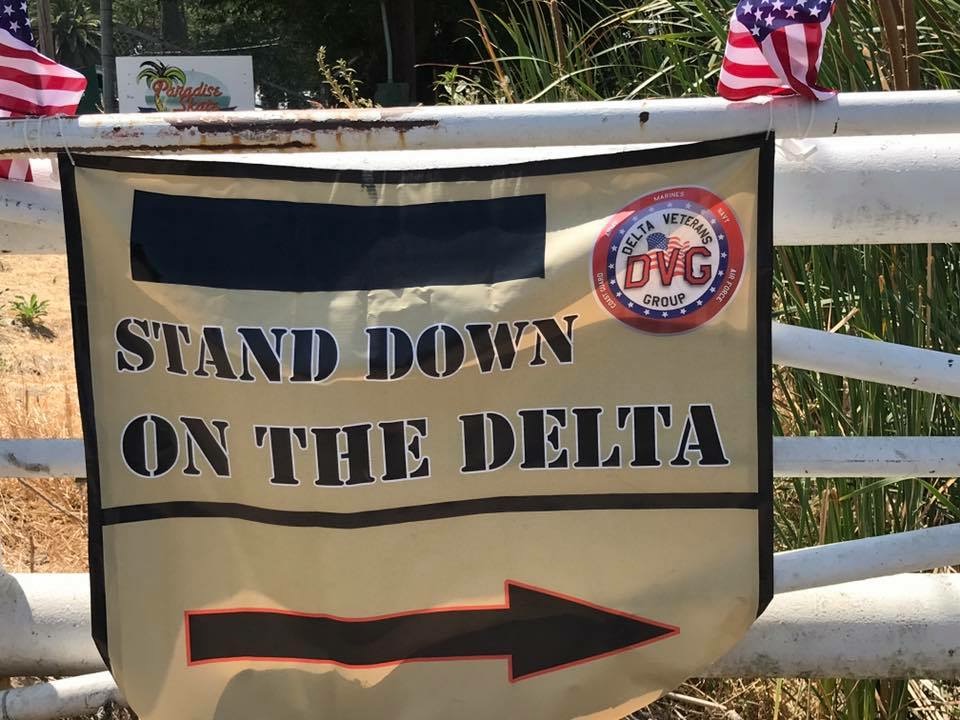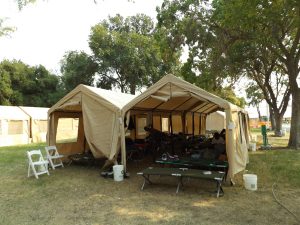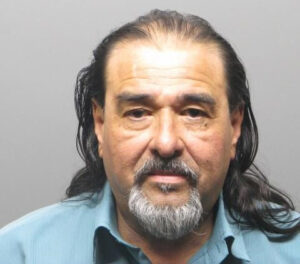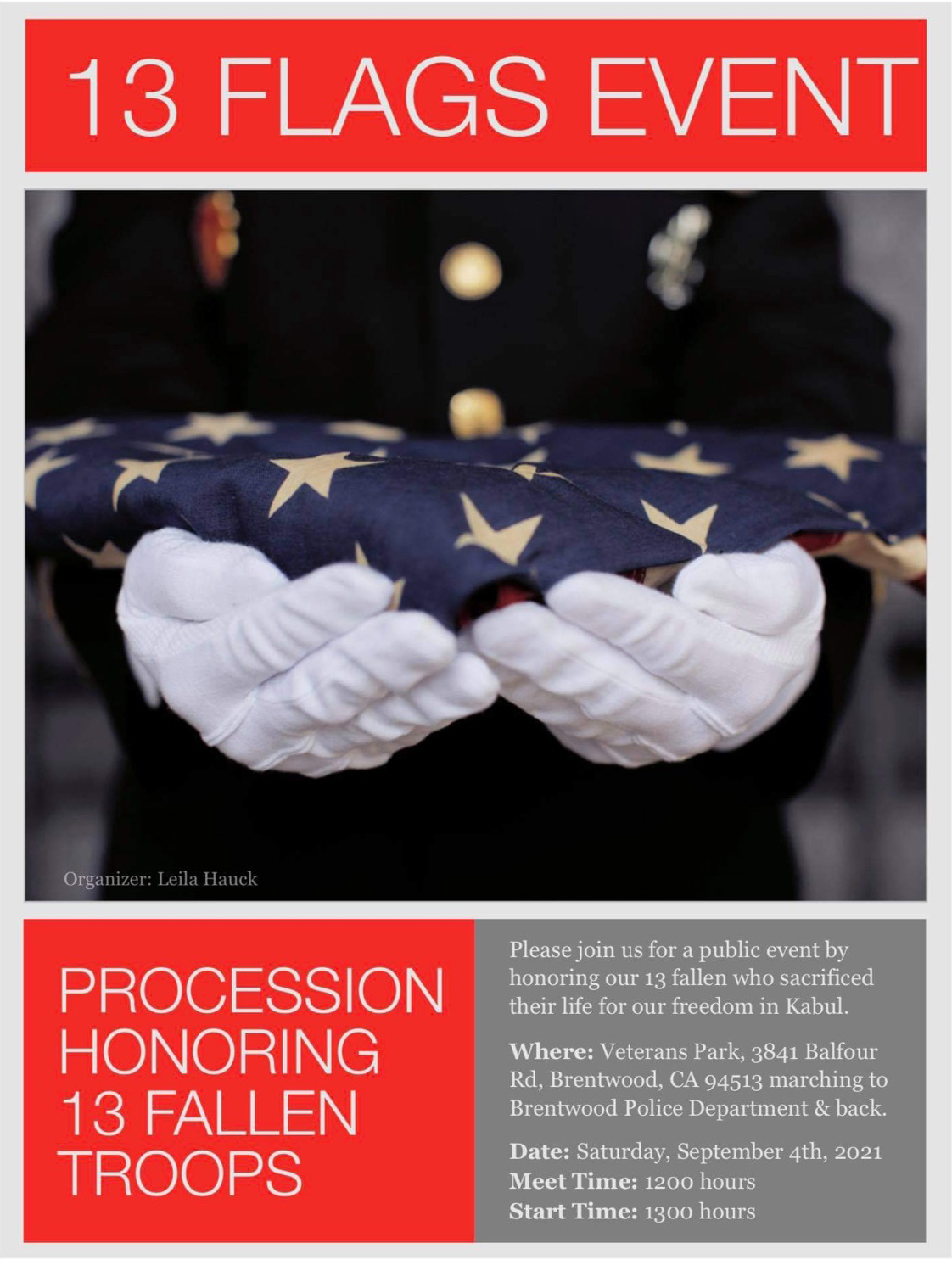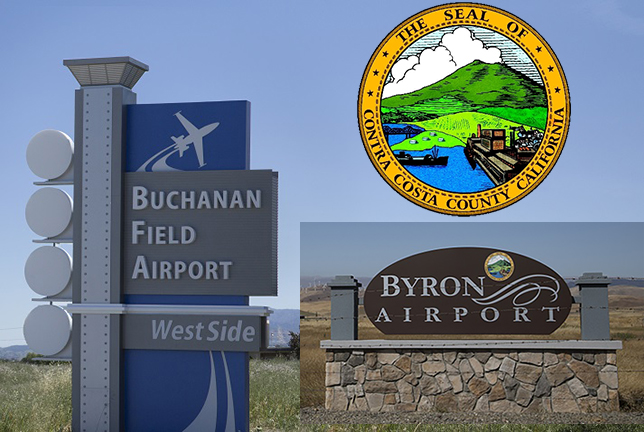Semi-annual veterans support event at fairgrounds in Antioch will be replaced by Stand-Up on the Delta 2022
By Gerald “J.R.” Wilson, Jr., CEO & President, Delta Veterans Group Board of Directors
The Delta Veterans Group (DVG) Board of Directors, with deep sadness, had made the decision to postpone Stand Down on the Delta for 2021. The Board of Directors did not make this decision alone, but with the recommendation and guidance of the Department of Veterans Affairs Health to include our local Medical VA Outpatient Clinic in Martinez, Contra Costa County Health Department as well as our community partners.
The event to support local veterans has been held every other year, during odd-numbered years, at the Contra Costa Event Park (fairgrounds) in Antioch. During even-numbered years, a similar event is held at the Alameda County Fairgrounds in Pleasanton.
The DVG Board has elected to conduct a “Stand-Up on the Delta 2022” and has secured the Contra Costa County Fairgrounds for May 31 through June 8, 2022. The Stand-Up on the Delta will take place June 3-5, 2022, a three-day event.
Although Stand-Up on the Delta will be different than a traditional Stand Down event, it will provide many services that our veterans in the Bay Area need. This event will be opened to all veterans and will have service providers from our four-core areas (Health, Employment, Housing and Education). We still plan on having our “Fishing on the Delta”, Roller Skating, Car Show, Animal Care, Clothing, Legal Aid, Veteran Information Seminars, Veteran Legislative Seminars, Barbers, Bands, DMV, Health Fair, Dental, Vision and other essential services. The main difference is that there will be no overnight housing and the Stand-Up will be held every day from 8 AM to 6 PM.
The VA, on a national scale, has decided to step away from supporting 52 Stand Downs throughout the country, this year. As we watched the COVID-19 numbers increase daily, including among those who have been vaccinated, we became extremely concerned for the safety of our volunteers and veterans. Many of our service organizations and individual volunteers have informed us they would be unable to attend due to the increase in COVID-19 cases affecting their safety and the safety of their employees.
If you are a volunteer, watch your email in the late winter / early spring of 2022. We will be adding new time slots to reflect the new dates. The email will let you know when the website is ready for volunteer sign ups.
If you are a vendor or a service provider, we ask that you understand this was not an easy decision to postpone the Stand Down. We hope that you will keep in contact with your coordinator and accept our invitation to join us in June 2022 for “Stand Up on the Delta”.
If you are a veteran that has registered as a “Participant” we ask that you continue to stay safe, and we will continue to work with you towards Stand Up on the Delta (June 3-5, 2022) and your continuing journey.
We plan to hold our Stand Up on the Delta 2022 meetings, beginning in early in 2022, for a successful return to what we do best – providing “a Hand Up, not a Hand-Out” to all of our Veterans.
Hope to see you all safe and healthy in 2022!
Allen Payton contributed to this report.
Read MoreRecorded act on his cell phone
WARNING: Explicit sexual content
OAKLAND – Adalberto Borja Guardado pleaded guilty yesterday in Oakland federal court to enticement and coercion of a minor, announced Acting United States Attorney Stephanie M. Hinds and Homeland Security Investigations Special Agent in Charge Tatum King. (See related article)
In his plea agreement, Guardado, 67, of San Pablo, admitted that on September 9, 2019, a three-year-old girl visited his residence with her mother, who provided home health care to Guardado’s elderly mother. Guardado agreed to watch the girl while the girl’s mother provided the home care in another part of the residence. Guardado admitted in his plea agreement that within a few minutes of watching the girl, he pulled down the girl’s pants and touched her vagina with his fingers. He further admitted that he used his cell phone to record his touching of the girl’s vagina.
Guardado was charged by criminal information in federal court on June 10, 2021, with enticement and coercion of a minor, in violation of 18 U.S.C. § 2422(b). The penalty for a violation of 18 U.S.C. § 2422(b) is a maximum imprisonment term of life in prison, with a mandatory minimum imprisonment term of ten years, and a fine of $250,000. However, any sentence imposed by a court will occur only after the court’s consideration of the U.S. Sentencing Guidelines and the federal statute governing the imposition of a sentence, 18 U.S.C. § 3553.
Guardado’s sentencing hearing is scheduled for January 11, 2022, in United States District Court in Oakland before the Honorable Jeffrey S. White, United States District Judge. Guardado remains in custody while awaiting his sentencing.
Jonathan U. Lee is the Assistant U.S. Attorney who is prosecuting the case, with the assistance of Leeya Kekona, Kay Konopaske, and Kathleen Turner. The prosecution is the result of an investigation by Homeland Security Investigations, the Silicon Valley Internet Crimes Against Children Task Force, and the San Pablo Police Department.
Read More
 Every year seems to bring one challenge after another, and in California, we’re used to tackling them head-on. But while Californians have become accustomed to wildfire season and the unpredictability it brings, patients in Contra Costa County have unfortunately also become accustomed to their quality of emergency medical services (EMS) going up in flames. To make matters worse, our state officials are considering legislation that would guarantee this inadequate patient care continues.
Every year seems to bring one challenge after another, and in California, we’re used to tackling them head-on. But while Californians have become accustomed to wildfire season and the unpredictability it brings, patients in Contra Costa County have unfortunately also become accustomed to their quality of emergency medical services (EMS) going up in flames. To make matters worse, our state officials are considering legislation that would guarantee this inadequate patient care continues.
As many Contra Costa residents are well aware, the county fire departments have absorbed ambulance services – previously provided by private operators at a lower cost to taxpayers – to pad their already bloated pensions since 2016. What many residents probably don’t know, is that 60 to 80 percent of the fire department’s budget goes to paying off their pension obligations. The California Pension Tracker notes that the market basis pension liability per household is $81,634. That sum surpasses many residents’ annual income. To fund upcoming pension payments that are currently underfunded, fire unions have called for additional tax measures and service redistribution that ultimately leaves county residents at a disadvantage. So, while residents are seeing costs go up, they’re seeing EMS response times and quality of care diminish. That’s just not right.
In Contra Costa, our ambulance services are dictated by something deemed the Alliance model. This is where the fire department is given complete control of all emergency services, without the typical oversight of an EMS agency. This type of model breeds misbehavior because oversight is virtually non-existent, and the fire department can run ambulance services as they see fit. It’s no wonder that in 2018 the California Emergency Medical Services Authority (CEMSA) suspected that Costa Costa’s largest fire department, ConFire, colluded with the county’s local EMS Agency to rig bidding on contracts that supported public-private partnerships in ambulance services. They simply want the services for themselves, while subcontracting it to a private company for cheap. A win-win for ConFire, but a loss for everyone else.
Assemblyman Tim Grayson introduced legislation that would codify this backwards EMS services model at the state level, and Contra Costa’s misbehavior will become commonplace. Assembly Bill 389 (AB 389) allows a county to develop an EMS program where the fire department holds all decision-making power regarding ambulance services. AB 389 not only hurts the patients EMS programs serve, but it also hurts the programs’ workers too. This legislation hinders the worker’s ability to bargain over working conditions, like fatigue relief, and is one of the many reasons both AFSCME and SEIU have publicly opposed it.
As healthcare workers are already facing higher levels of burnout and exhaustion, now is not the time to diminish what benefits they are rightfully given. Instead of championing measures that support high-functioning workers and elevated patient care, state officials are being hoodwinked by fire unions to further their own agendas. I find it troubling that ConFire gave themselves a 15 percent raise in the middle of a pandemic, rather than putting money towards community services. Yet, state officials still think they are the poster child of success and other counties should follow their lead.
Our elected officials should support legislation where quality care for patients and quality pay for EMS workers are the foundation, not inflating pensions to keep with the current status quo. Fires are raging across our great state, and that’s where fire unions should keep their focus.
Mark Fernwood
Danville
Read MoreGovernor, Senator Glazer and Assembly Member Bauer-Kahan reach accord on protecting Tesla’s 3,100-acre unique habitat
CONTRA COSTA – Thousands of acres of East Bay wilderness threatened by the expansion of an off-highway vehicle park will instead be preserved under an agreement reached Monday by Gov. Gavin Newsom and the Legislature, state Sen. Steve Glazer (D-Contra Costa) and Assembly Member Rebecca Bauer-Kahan (D-Orinda) announced.
The agreement, if approved by the Legislature next week, will end plans to expand the Carnegie State Vehicular Recreation Area into the 3,100-acre Tesla parcel in the southeast corner of Alameda County, east of Livermore along the San Joaquin County line, which scientists have described as a biologically unique habitat and Native Americans have long considered to be a sensitive historical site.
That land will now become a new state park closed to motorized recreation. The state will reimburse the Off-Highway Vehicle fund for the purchase price of the land, its appreciation in value, and the money spent planning the expansion, which was opposed from the start 20 years ago by nearby residents and public agencies. That money will go toward the purchase and development of an off-road park at another location.
“This is a win-win for all involved,” Sen. Glazer said. “Our community and region gets to preserve this natural and cultural treasure while the off-road enthusiasts will keep their current park and receive funding to develop another park on land that’s more suitable to that kind of recreation.”
Assembly Member Bauer-Kahan said she was pleased that the agreement will end years of doubt about the fate of the area’s rich biological and cultural resources.
“We are incredibly thankful that the governor has seen Tesla Park’s value and included it in the ongoing protection of critical natural resources,” Bauer-Kahan said. “It has been my great honor to fight alongside Senator Glazer, the Sierra Club, Friends of Tesla Park and countless organizations and individuals to ensure this land will be protected and enjoyed by all of California’s citizens.”
Preserving the Tesla land was a major priority for environmentalists, including the Sierra Club.
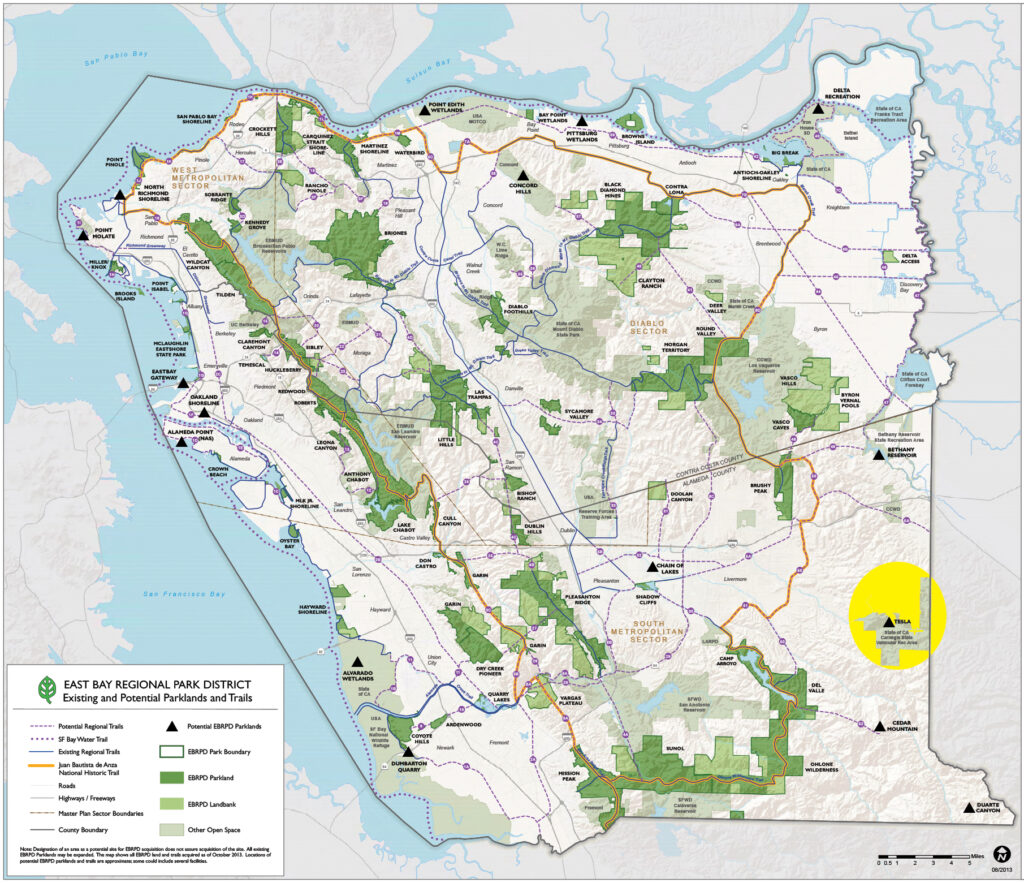
East Bay Regional Park District 2013 Master Plan Map designating Tesla site (yellow area) as a potential regional preserve. Source: EBRPD
“We applaud the decision by the California Legislature and Administration to preserve the important ecological value and biodiversity of Tesla Park by banning off-highway vehicle recreational use,” said Brandon Dawson, director of the Sierra Club California. “Sierra Club California and our local allies have advocated for decades to protect Tesla Park. This agreement represents a major victory for environmentalists across the state.”
“I want to thank Senator Steve Glazer and Assembly member Rebecca Bauer-Kahan for their persistence to protect this valued land,” Dawson said. “This would not be possible without their championing of the area.”
Nancy Rodrigue, a leading member of the Friends of Tesla Park steering committee and Livermore resident, said she was proud that years of hard work and persistence paid off.
“Tesla Park will now forever be protected with no motorized recreation. The future holds Tesla as a protected native landscape for hikers, history buffs, nature lovers, research and education,” Rodrigue said. “Saving Tesla Park has been a long, difficult, and now rewarding journey. We want to thank the many local officials, public agencies, community organizations and citizens who saw Tesla’s true value – its irreplaceable biodiversity and cultural riches. We are grateful for the tremendous work of so many, including Senator Glazer and Assemblymember Bauer-Kahan, for saving Tesla Park as a legacy for future generations.”
Senator Glazer has been a leading voice in the Legislature to preserve Tesla and turn it into a park for non-motorized use. He has carried legislation every year since 2018 to allow or require the Department of Parks and Recreation to end its plans to expand the Carnegie off-road park and instead preserve the Tesla land, either by selling it to a third party or keeping it under state control.
That effort began as a partnership with former Assembly Member Catharine Baker of Livermore. Baker helped rally local officials to the cause, but Glazer’s early bills, while passing in the Senate, were blocked in the Assembly despite Baker’s support.
Assembly Member Bauer-Kahan joined the battle to save the Tesla parcel after her 2018 election and was able to persuade her fellow Assembly members, including the leadership, to join the Senate’s effort to preserve the land.
With both houses of the Legislature united, Glazer and Bauer-Kahan were finally able to convince the Newsom Administration this year that the idea of expanding the Carnegie park was doomed to failure.
Their argument was bolstered by a Superior Court judge’s ruling that the State Department of Parks and Recreation’s 2016 environmental impact report and general plan for Carnegie State Vehicular Recreation Area, which included opening the Tesla land to off highway vehicle (OHV) recreation, was legally invalid.
“I want to thank Senate President Pro Tem Toni Atkins and Assembly Speaker Anthony Rendon for their vision in seeing that this land was not appropriate for off-road vehicle use and for finding a way to preserve it,” Glazer said. “I also want to thank Gov. Newsom for taking a fresh look at this issue and agreeing to move in a new and better direction.”
The agreement will repay the Off-Highway Vehicle Trust Fund $18.3 million for the estimated current value of the land plus $2.4 million that the fund used for planning the current park’s expansion. Another $11.5 million will be set aside for planning and construction of an alternative off-road park, while $1 million will go toward turning the Tesla property into a non-OHV park.
The Tesla land offers rare and valuable diversity such as Blue Oak woodland, mountain savannah grassland, scrub sage, and riparian woodlands. It is a richly biodiverse area that has drawn naturalists, ecologists, zoologists, and other scientists to that land for more than 100 years to study nature and natural systems.
It has been known by generations of scientists for its extraordinary biodiversity, including numerous threatened and endangered species. It is a critical linkage wildlife habitat corridor, a California Native Plant Society botanical priority protection area and Audubon important bird area. Native Californian archaeological and ceremonial sites and the historic town site and coal mine of Tesla are also located on the 3,100-acre Tesla site.
See more photos and information at SaveTeslaPark.org.
Read MoreTwo struck including a child, other person dies
By Jimmy Lee, Director of Public Affairs, Contra Costa County Office of the Sheriff
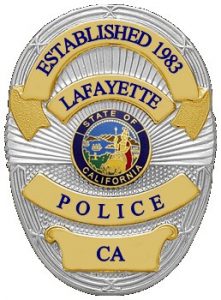 Wednesday afternoon at about 2:56 pm, Lafayette police officers were advised of a vehicle versus pedestrian collision in front of Stanley Middle School located at 3455 School Street in Lafayette.
Wednesday afternoon at about 2:56 pm, Lafayette police officers were advised of a vehicle versus pedestrian collision in front of Stanley Middle School located at 3455 School Street in Lafayette.
One person was reported to be trapped under a vehicle. Lafayette police officers, who were assisted by citizens, were able to pull an unresponsive person out from under the vehicle. Officers administered CPR until relieved by fire department personnel. He was later transported to a local hospital where he was pronounced deceased. He is not being identified at this time.
One child, who was also struck by the vehicle, suffered minor injuries. He was taken to a hospital as a precaution.
An investigation is underway. The driver of the vehicle is cooperative and has been interviewed. The driver is not being identified.
Anyone with information on this incident is asked to contact Sgt. C. Jacquez of the Lafayette Police Department at (925) 299-3234 or by email – cjacq@so.cccounty.us.
Read More
Due Sept. 24; Academy begins Oct. 13
By Scott Alonso, PIO, Contra Costa County Office of the District Attorney
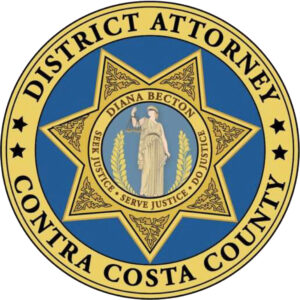 District Attorney Diana Becton announced Tuesday, that the Contra Costa County District Attorney’s Office will launch a fourth Community Academy class this October. The goal of the academy will be to strengthen community relations and provide residents a better understanding of our criminal justice system. Given the COVID-19 pandemic, this fall’s class will be limited, and social distancing measures will be followed. Participants will be required to wear a mask while participating during the academy.
District Attorney Diana Becton announced Tuesday, that the Contra Costa County District Attorney’s Office will launch a fourth Community Academy class this October. The goal of the academy will be to strengthen community relations and provide residents a better understanding of our criminal justice system. Given the COVID-19 pandemic, this fall’s class will be limited, and social distancing measures will be followed. Participants will be required to wear a mask while participating during the academy.
The academy is free and is open to residents who live or work in Contra Costa County. Individuals must complete an application and background check when they apply. Residents can access an application on our website or residents may also apply in-person at one of our offices at the following locations:
- 900 Ward Street, Martinez, CA 94553
- 10 Douglas Drive Suite 130, Martinez, CA 94553
- 100 37th St. Room 220, Richmond, CA 94805
Residents can submit the applications to the attention of Scott Alonso. Applicants may also email DA-CommunityAcademy@contracostada.org with their completed application. The application period ends on September 24, 2021.
The Community Academy will be made up of at least 10 individuals for a 9-week course held at the DA’s Office in downtown Martinez, 900 Ward Street from 5:30-7:30 p.m. every Wednesday starting October 13, 2021. The Community Academy, which is similar to Citizens’ Academies hosted by many law enforcement agencies, is the only academy of its kind at a District Attorney’s Office in Northern California.
The academy helps underscore the office’s commitment to engaging and educating residents of Contra Costa County. Admitted applicants can expect to learn how cases are filed, the different types of crimes our office investigates and prosecutes, and the work we do not only prosecuting cases but also the community outreach efforts underway to prevent crime and to support children, parents and crime victims. The comprehensive overview by our office will allow residents to get an in-depth examination and review of the criminal justice system in our community.
Read MoreVictims from Bay Point and Oakley identified
By CHP – Contra Costa
Saturday night, Sept. 4, 2021, at approximately 11:14 pm, CHP Contra Costa was advised of a vehicle vs. pedestrians collision at 8321 Byron Hwy in Knightsen. Upon CHP and emergency personnel arrival, two pedestrians had been struck by a vehicle and that vehicle (a 2002 Subaru Impreza), along with the driver (18-year-old male from Knightsen), were also located. Tragically both pedestrians were killed as a result of the crash (18-year-old female from Bay Point and 16-year-old male from Oakley).
The Contra Costa County Sheriff’s Coroner’s Office identified the deceased pedestrians as Kassandra Sepulveda of Bay Point and Luis Esparza of Oakley.
The 18-year-old driver of the Subaru was investigated for DUI at the scene and subsequently placed under arrest for suspicion of Felony DUI driving, resulting in the death of both pedestrians. The driver was transported to the Martinez detention facility and booked into jail for: FELONY DUI 23153(a)VC and Gross Vehicular Manslaughter 191.5(a)PC.
The suspected DUI and Manslaughter driver is Colby Sharver.
Read MoreApplication deadline Sept. 30
Contra Costa County (County) is accepting applications for the upcoming Member at Large opening on the Aviation Advisory Committee (AAC). The term begins March 1, 2022, upon appointment by the Airport Committee, and expires on February 28, 2025. Residents of and/or employees in Contra Costa County are eligible to fill this position to represent all County stakeholders in matters related to Buchanan Field and Byron Airports.
The AAC serves as an advisory group to the Contra Costa County Board of Supervisors (Board) to provide advice and recommendations to the Board on aviation matters related to the Contra Costa County Airports. The AAC typically meets once per month on the second Thursday of the month at 10:00 a.m., in person or via Zoom during the pandemic at either Buchanan Field or Byron Airport.
Application forms can be obtained from the Clerk of the Board of Supervisors by calling (925) 655-2000 or at: https://www.contracosta.ca.gov/3418/Appointed-Bodies-Committees-Commissions. Applications should be submitted online or returned to the Clerk of the Board of Supervisors, County Administration Building, 1025 Escobar Street, 1st Floor, Martinez, CA 94553, no later than 5:00 p.m. on Thursday, September 30, 2021. Applicants should plan to be available for public/Zoom interviews, tentatively scheduled for December 8, 2021 at 11:00 am at the Airports Committee Meeting.
For more information on the Contra Costa County Airports or the AAC visit us at www.ContraCostaCountyAirports.org or by calling (844) Fly-ToUs or (844) 359-8687.
CONTACT: Keith Freitas at (844) 359-8687, or via email at: airport.team@airport.cccounty.us
Read More
By Scott Alonso, PIO, Contra Costa County Office of the District Attorney
 Last week, defendant Donald Kelly of Bay Point (date of birth October 31, 1980) was found guilty of attempted criminal threats, a felony, and brandishing a replica firearm, a misdemeanor, against a female victim. Kelly faces up to three years in state prison for the attempted criminal threats conviction.
Last week, defendant Donald Kelly of Bay Point (date of birth October 31, 1980) was found guilty of attempted criminal threats, a felony, and brandishing a replica firearm, a misdemeanor, against a female victim. Kelly faces up to three years in state prison for the attempted criminal threats conviction.
On March 2, 2021, the victim was in a car outside an apartment complex on the corner of Belle Monte Ave and Willow Pass Road in Bay Point. The defendant appeared outside the victim’s car and held what appeared to be a semi-automatic firearm and pointed it at the victim’s head. Kelly yelled at the victim and stated, “This is a real gun.” Another witness who observed the interaction between Kelly and the victim heard Kelly also yell that he was going to shoot the victim. Kelly fled the scene after the victim called 911. He was detained shortly after he left the scene. When Kelly was detained, deputies located a replica Sig Sauer P226 firearm.
Deputy District Attorney Haleigh Parkinson prosecuted the case on behalf of the People. The defendant will be sentenced on September 17 before the Honorable Wade Rhyne. The case was investigated by the Contra Costa County Sheriff’s Office. The DA’s Office originally filed criminal charges against Kelly in March of this year.
Case information: People v. Donald Kelly, Docket Number 04-201411-6.
Read More





